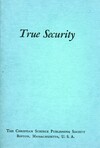

Are you sure?
This bookmark will be removed from all folders and any saved notes will be permanently removed.
"WHO TOLD THEE?"
The word rumor is defined by a dictionary in part as "a story or report current without any known authority for its truth." At the outbreak of the recent global conflict it was quickly recognized that because of the credulity of human thought regarding anything sensational or of evil report, rumor was one of the most dangerous weapons which the enemy could wield. Particularly so because it was one which the unwatchful could easily be persuaded to wield against themselves. Therefore in England it was soon declared to be an indictable offense to "spread alarm and despondency" in the form of rumors. We were constantly exhorted to examine with the utmost care any statements made to us, to determine their source, and, if they were not issued with the authority of His Majesty's government, utterly to reject them as false. It is incalculable how many times not only the peace of mind, but the individual safety, of British citizens was preserved by obeying this simple rule.
The use of rumor as a weapon of the enemy is a very ancient device. Many examples are to be found in the Bible. Perhaps one of the most notable occurs in Nehemiah's narrative of how he organized his countrymen and rebuilt the walls of Jerusalem in the face of bitter opposition. The steadfastness and singleness of purpose manifested by Nehemiah were a source of great inspiration to his people and served to encourage and strengthen them until the wall of Jerusalem was almost completed.
Then, at this crucial time when success seemed assured, two men, Sanballat and Geshem, who had persistently opposed this righteous activity in various and subtle ways, allowed themselves to be mesmerized by envy and jealousy, by what we should today call aggressive mental suggestion, and decided to use the weapon of rumor against this intrepid leader. They conspired together, and Sanballat sent a letter to Nehemiah in which he stated (6:6, 7): "It is reported among the heathen, and Gashmu saith it, that thou and the Jews think to rebel: for which cause thou buildest the wall, that thou mayest be their king. ...Come now therefore, and let us take counsel together."
Enjoy 1 free Sentinel article or audio program each month, including content from 1898 to today.
JSH Collections
This article is included in:
1951 - PAMPHLET
True security
JSH-Online has hundreds of pamphlets, anthologies, and special editions for you to discover.
June 24, 1950 issue
View Issue-
"WHO TOLD THEE?"
NOEL D. BRYAN-JONES
-
MY WORK
Ethel Louise Bennett
-
MAN'S SAFETY ASSURED
ANNE R. ADAMS
-
THE WAY OF PROGRESS
RICHARD HOLMES STRAIN, JR.
-
MAN'S PERMANENT HOME
ARLENE SHULL MAHONE
-
HIS GIFT
Ruth A. Chapin
-
"YE ARE MY WITNESSES"
ETHEL DANIELS HUBBARD
-
NOT JUST FOR THE RIDE
GRACE K. STICHT
-
TRUTH'S ANSWER
Myrtle G. Egan
-
THE STRAIGHT WAY
Helen Wood Bauman
-
THE MISSION OF THE NEW WOMAN
Robert Ellis Key
-
"Let the redeemed of the Lord...
Helen T. Smith
-
I am thankful to God for Christian Science
Alejandro Vrabiescu with contributions from Margarita Vrabiescu
-
I wish to express my gratitude...
William Schneider
-
"O give thanks unto the Lord;...
Helen M. Stelzriede
-
For almost twenty years I have...
Frieda Scholze
-
In 1933 I was suffering from a...
Dorothy Dunkel
-
At the close of World War I, an...
Freda B. May
-
This testimony is written in...
Joan Nanette Wilson
-
Signs of the Times
with contributions from Murl Vance, James L. Duncan, Harvey L. Humphrey, Stewart Mechie, Rollin H. Walker



